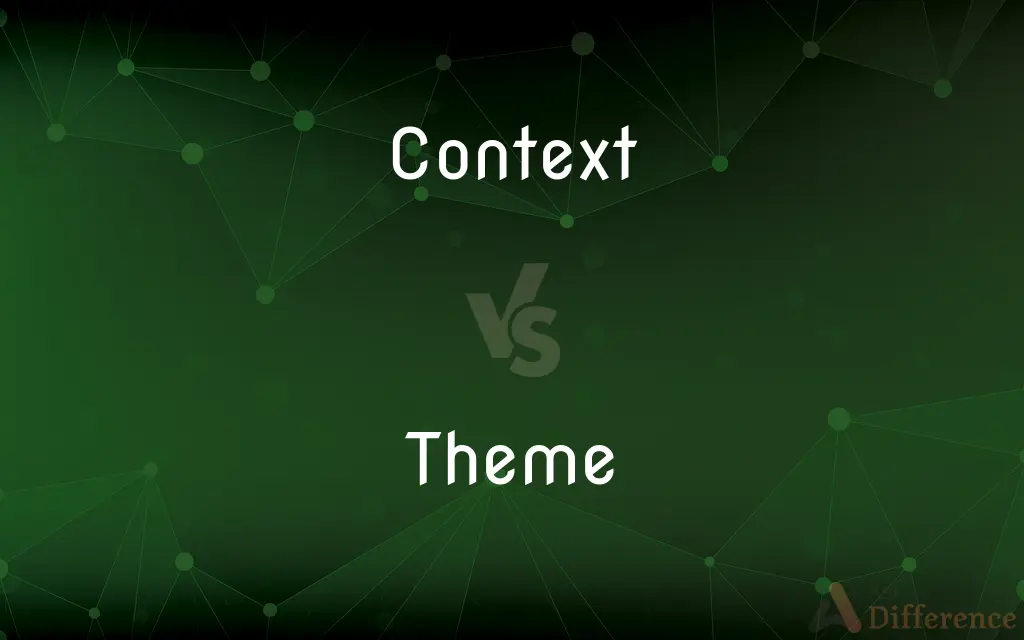Context vs. Theme — What's the Difference?
By Tayyaba Rehman & Maham Liaqat — Updated on March 29, 2024
Context provides the setting or circumstances surrounding an event or story, shaping its meaning, while theme refers to the underlying message or central idea explored within.

Difference Between Context and Theme
Table of Contents
ADVERTISEMENT
Key Differences
Context encompasses the various elements that influence the environment or setting in which a story or event takes place. This can include historical period, location, cultural background, and societal norms. On the other hand, theme is the central topic or idea that a story or piece of writing seeks to explore and convey, such as love, justice, or freedom.
While context sets the stage, providing background and conditions that affect characters and plot, theme delves deeper, offering insights or commentary on human experience or societal issues. For instance, the context of a novel set during the American Civil War provides understanding of the characters’ behaviors and challenges, whereas its theme might explore the moral complexities of freedom and equality.
Understanding the context is crucial for interpreting the actions and motivations of characters within a story, as well as for grasping the significance of events. Conversely, identifying the theme offers insight into the writer's message or the broader implications of the narrative, transcending the immediate story to touch on universal truths.
Context can change based on the specific circumstances or time periods, affecting the narrative's relevance or perception by different audiences. Meanwhile, themes tend to be more timeless and universal, capable of resonating with audiences across various contexts.
In literature, the context might be explicitly provided by the author or inferred from clues within the text, requiring reader interpretation. Themes, however, are usually inferred from the recurring patterns, characters’ developments, and the resolution of conflicts, demanding a more in-depth analysis to uncover.
ADVERTISEMENT
Comparison Chart
Definition
The setting or circumstances surrounding an event
The underlying message or central idea
Focus
Background and conditions
Insights or commentary on human experience
Role
Sets the stage for the narrative
Offers insight into the writer's message
Variability
Can change based on time and place
More timeless and universal
Interpretation
May be explicit or inferred
Inferred from the narrative
Compare with Definitions
Context
Conditions that surround a situation or event.
Understanding the social context of the story is crucial for interpreting its characters.
Theme
The underlying message or central idea of a story.
The theme of love triumphing over adversity is central to the narrative.
Context
Background information that adds meaning to a conversation or event.
The political context of the era shapes the protagonist's actions.
Theme
A motif or topic explored in a work of art or literature.
The theme of identity and belonging permeates the collection of stories.
Context
The setting in which a word or statement appears that determines its meaning.
The context of her remarks clarified her true intentions.
Theme
A recurring idea that is woven through the narrative.
The novel explores the theme of justice through its characters' journeys.
Context
The circumstances that form the setting for an event, statement, or idea.
The historical context of the novel enhances its realism.
Theme
The philosophical or moral questions explored by the narrative.
The theme of freedom versus destiny is debated throughout the play.
Context
The environment or situation that influences the story or event.
The cultural context of the poem enriches its imagery.
Theme
The main subject that is being discussed or described.
Environmental conservation is the theme of the documentary.
Context
The part of a text or statement that surrounds a particular word or passage and determines its meaning.
Theme
A topic of discourse or discussion.
Context
The circumstances in which an event occurs; a setting.
Theme
A subject of artistic representation.
Context
The surroundings, circumstances, environment, background or settings that determine, specify, or clarify the meaning of an event or other occurrence.
In what context did your attack on him happen? - We had a pretty tense relationship at the time, and when he insulted me I snapped.
Theme
An implicit or recurrent idea; a motif
A party with a tropical island theme.
Context
(linguistics) The text in which a word or passage appears and which helps ascertain its meaning.
Without any context, I can't tell you if the "dish" refers to the food, or the thing you eat it on.
Theme
A short composition assigned to a student as a writing exercise.
Context
(archaeology) The surroundings and environment in which an artifact is found and which may provide important clues about the artifact's function and/or cultural meaning.
Theme
(Music) A recurring melodic element in a composition, especially a melody forming the basis of a set of variations.
Context
(mycology) The trama or flesh of a mushroom.
Theme
See topic.
Context
(logic) For a formula: a finite set of variables, which set contains all the free variables in the given formula.
Theme
A stem.
Context
(obsolete) To knit or bind together; to unite closely.
Theme
A subject, now especially of a talk or an artistic piece; a topic.
Context
(obsolete) Knit or woven together; close; firm.
Theme
A recurring idea; a motif.
Context
Knit or woven together; close; firm.
The coats, without, are context and callous.
Theme
A concept with multiple instantiations.
Variations on the theme of entrepreneurial resourcefulness
Context
The part or parts of something written or printed, as of Scripture, which precede or follow a text or quoted sentence, or are so intimately associated with it as to throw light upon its meaning.
According to all the light that the contexts afford.
Theme
Any of various colors, or color palettes, in which a design is offered; (GUI) any of various skins for an app, affecting the visuals and perhaps other elements such as sound effects.
Switch to a dark theme to conserve battery power
Context
To knit or bind together; to unite closely.
The whole world's frame, which is contexted only by commerce and contracts.
Theme
(dated) An essay written for school.
Context
Discourse that surrounds a language unit and helps to determine its interpretation
Theme
(music) The main melody of a piece of music, especially one that is the source of variations.
Context
The set of facts or circumstances that surround a situation or event;
The historical context
Theme
A song, or a snippet of a song, that identifies a film, a TV program, a character, etc. by playing at the appropriate time.
Theme
(grammar) The stem of a word.
Theme
(linguistics) thematic relation of a noun phrase to a verb.
Theme
(linguistics) Theta role in generative grammar and government and binding theory.
Theme
(linguistics) Topic, what is generally being talked about, as opposed to rheme.
Theme
A regional unit of organisation in the Byzantine empire.
Theme
(transitive) To give a theme to.
We themed the birthday party around superheroes.
Theme
To apply a theme to; to change the visual appearance and/or layout of (software).
Theme
A subject or topic on which a person writes or speaks; a proposition for discussion or argument; a text.
My theme is alway one and ever was.
And when a soldier was the theme, my nameWas not far off.
Theme
Discourse on a certain subject.
Then ran repentance and rehearsed his theme.
It was the subject of my theme.
Theme
A composition or essay required of a pupil.
Theme
A noun or verb, not modified by inflections; also, that part of a noun or verb which remains unchanged (except by euphonic variations) in declension or conjugation; stem.
Theme
That by means of which a thing is done; means; instrument.
Theme
The leading subject of a composition or a movement.
Theme
The subject matter of a conversation or discussion;
He didn't want to discuss that subject
It was a very sensitive topic
His letters were always on the theme of love
Theme
A unifying idea that is a recurrent element in a literary or artistic work;
It was the usual `boy gets girl' theme
Theme
(music) melodic subject of a musical composition;
The theme is announced in the first measures
The accompanist picked up the idea and elaborated it
Theme
An essay (especially one written as an assignment);
He got an A on his composition
Theme
(linguistics) the form of a word after all affixes are removed;
Thematic vowels are part of the stem
Theme
Provide with a particular theme or motive;
The restaurant often themes its menus
Common Curiosities
Why is context important in understanding literature?
Context provides crucial background information that helps readers understand the characters' motivations, behaviors, and the significance of events.
How is theme expressed in a story?
Theme is expressed through characters' development, conflicts, and the resolution of the story, often requiring analysis to identify.
Can a story have multiple themes?
Yes, a story can explore multiple themes, reflecting various insights and messages through its narrative.
How do authors use context to enhance a story?
Authors use context to provide background, set the mood, and influence the narrative's direction, making the story more engaging and believable.
How does theme differ from plot?
Theme is the underlying message or central idea explored in a story, while plot refers to the sequence of events that make up the narrative.
Is the theme always explicitly stated by the author?
No, themes are usually inferred by the readers through the story’s development and the resolution of its conflicts, rather than being explicitly stated.
What is context in literature?
Context in literature refers to the background, environment, or setting that influences the story's events, characters, and themes.
How does cultural context influence a story?
Cultural context influences a story by embedding characters and events within specific traditions, beliefs, and social dynamics, adding depth and realism.
What role does context play in interpreting historical texts?
Context is essential for interpreting historical texts, as it helps understand the period’s societal norms, beliefs, and events that influence the text.
Can the context of a story affect its theme?
The context of a story can influence how its themes are presented and perceived, shaping the narrative's overall message and impact.
Can context change over time?
Yes, the relevance or perception of a story's context can change over time as societal norms, values, and historical awareness evolve.
Can the same theme be explored in different contexts?
Yes, universal themes such as love, war, and identity can be explored across diverse contexts and historical settings.
How can understanding the theme of a work affect its interpretation?
Understanding the theme can deeply affect interpretation by revealing deeper meanings and insights beyond the surface narrative.
Do themes differ across genres?
Yes, themes can vary widely across genres, reflecting genre-specific concerns, such as dystopian themes in science fiction or love and betrayal in romance.
How do readers identify themes in a story?
Readers identify themes by analyzing characters, plot developments, and the resolution of conflicts, looking for underlying messages and insights.
Share Your Discovery

Previous Comparison
Trifle vs. Truffle
Next Comparison
Structural vs. StructureAuthor Spotlight
Written by
Tayyaba RehmanTayyaba Rehman is a distinguished writer, currently serving as a primary contributor to askdifference.com. As a researcher in semantics and etymology, Tayyaba's passion for the complexity of languages and their distinctions has found a perfect home on the platform. Tayyaba delves into the intricacies of language, distinguishing between commonly confused words and phrases, thereby providing clarity for readers worldwide.
Co-written by
Maham Liaqat















































